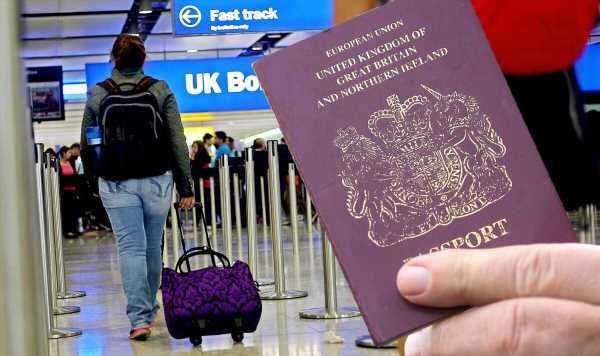Check your passport! Four passport checks to make before travelling abroad this summer
Passport delays: Holidaymaker warns of post-Brexit issues
We use your sign-up to provide content in ways you’ve consented to and to improve our understanding of you. This may include adverts from us and 3rd parties based on our understanding. You can unsubscribe at any time. More info
Passport delays at Her Majesty’s Passport Office have left eager travellers waiting as long as 10 weeks to receive a new or renewed passport. While long processing times are a key concern for many holiday-seekers, Britons are also being caught out by the fine print such as expiry and issue dates on their passports. These are the four key checks you should always make on your documents before heading abroad this summer.
PASSPORT processing delays are not the only thing that could catch holidaymakers out this summer, so what can you do to make sure your passport is valid for travel?
The expiry date
This may sound like one of the more obvious checks to make, but what exactly should you be looking for in the expiry date?
While a clearly out of date passport will leave you unable to travel abroad, you should also be looking at how soon your passport will expire beyond the dates of your trip.
All countries will have their own rules concerning passport validity and expiration rules, so it is crucial that you cross-check your expiry date with the guidelines set by your destination country.
Some countries including Australia and Barbados state that your passport must only be valid for the duration of your stay, while other countries like China and Egypt require at least six months validity beyond the date you plan to return home.


HM Passport Office recommended that Britons travelling to Europe have at least three months left on their passport on the day of departure.
European countries which require at least three months validity include Greece, Croatia, France, Germany, Portugal, Spain, Italy, Malta and Ireland.
The best place to check exact requirements is the Foreign Office’s travel advice for your destination – you can check this on the Government website.

The date of issue
Several EU countries in the Schengen Area set a 10 year limit on the time between your passport being issued, and the dates you plan to travel.
While your passport may have been issued within the last 10 years, it is also important to factor the validity requirements into this time frame.
For example, a country that requires at least six months on your passport after travel will only accept a passport that was issued no more than nine years and six months ago.
Similarly, a country that requires three months validity will only accept your passport if it was issued no more than nine years and nine months ago.
Before BREXIT, UK passports were issued and essentially allowed for this buffer, but this no longer applies in the same way.
Once you take into account the three to six month period after travel, you will only be allowed to travel if your passport was issued no more than nine years and nine months ago.
DON’T MISS:
Tourists queue for hours for new passports at government buildings [INSIGHT]
French firm behind UK passport delays and chaos to be reprimanded [REVEAL]
When do urgent passport appointments become available? [ANALYSIS]

Physical damage
Keeping an in-date passport is essential if you want to travel abroad, but you should also make sure that the document is kept in good condition too.
A damaged passport could be deemed as invalid by border control both on home soil, and abroad, so give it a once over to check for:
- Unreadable pages
- Ripped or missing pages
- Water damage
- Unexpected markings or writing
If your passport is visibly damaged, you can apply for a renewal or a replacement on the Government website.
Passport details
The Foreign Office has issued a specific pre-travel checklist for Brits to use as guidance before travelling abroad on holiday.
As part of its advice, the Foreign Office suggested that travellers check their passport contains up-to-date contact details and is correctly filled out.
The checklist states that Brits should:
- Take a photo or photocopy of the information page of your passport (the page with your photo, personal details and passport number)
- Store the information securely so it can be accessed if valuables/phones are lost or stolen
- Sign your passport on the page opposite your information page – an unsigned passport is not valid
- Fill in your emergency contact details in the back of your passport
Source: Read Full Article



